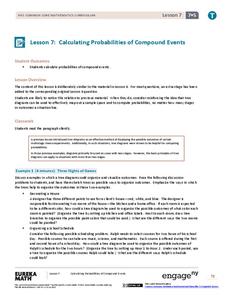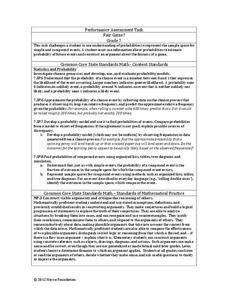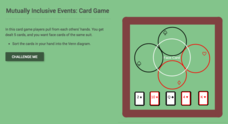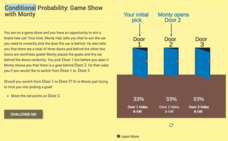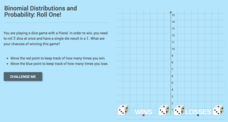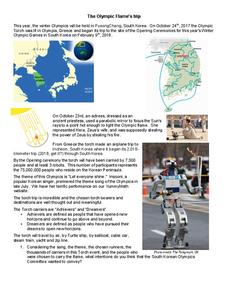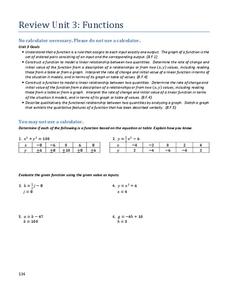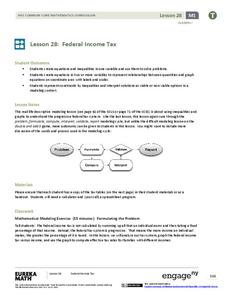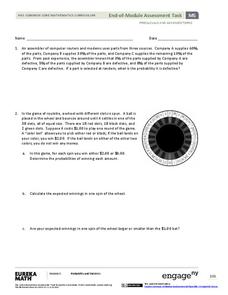CK-12 Foundation
Expected Value: Game of Chance
Determine whether the payoff is worth it. Pupils calculate the expected value of a game with three different payoff levels. Each level has a different probability of winning money. The scholars find the expected payoffs for each...
Inside Mathematics
Marble Game
Pupils determine the theoretical probability of winning a game of marbles. Individuals compare the theoretical probability to experimental probability for the same game. They continue on to compare two different probability games.
EngageNY
Calculating Probabilities of Compound Events
Use tree diagrams with multiple branches to calculate the probabilities of compound events. Pupils use tree diagrams to find the sample space for probability problems and use them to determine the probability of compound events in the...
Noyce Foundation
Fair Game?
The game should be fair at all costs. The mini-assessment revolves around the ability to use probabilities to determine whether a game is fair. Individuals determine compound events to calculate simple probabilities and make...
EngageNY
Grade 5 Math Module 1: End-of-Module Assessment
The last installment of the 18-part Grade 5 Math Module 1 is an end-of-module assessment. Scholars answer questions that require explaining the connection between powers of 10 and place value, rewriting decimals in different forms,...
CK-12 Foundation
Mutually Inclusive Events: Card Game
Find probabilities of pulling cards. Using a Venn diagram, individuals sort five cards along the rules of a game. The pupils calculate compound probabilities using the information from the diagram. Initially, the interactive provides the...
Curated OER
Interpret Clock Time
Save yourself a few minutes of planning with this elementary math lesson plan on elapsed time. Through a series of collaborative and independent learning activities, children explore different real-world situations as they learn how to...
Mrs. Burke's Math Page
Let Them Eat Pi
Looking for a fun and creative way to celebrate Pi Day? Then this is the resource for you. From a scavenger hunt and trivia contest to PowerPoint presentations and skills practice worksheets, this collection of materials is a...
EngageNY
Estimating Probabilities by Collecting Data
Take a spin to determine experimental probability. Small groups spin a spinner and keep track of the sums of the spins and calculate the resulting probabilities. Pupils use simulated frequencies to practice finding other probabilities to...
District 158
Plan an Adventure
For kids, taking a vacation is all fun and games, but after completing this pre-algebra project, they'll have a whole new appreciation for the planning that makes these trips possible. Given a budget of $5,000 to spend on purchasing the...
CK-12 Foundation
Conditional Probability: Game Show with Monty
The car is behind door one — no wait, it is behind door three. An interactive allows learners to visualize the Monty Hall problem. Pupils work through the probabilities of choosing the car with their first pick. Next, they determine...
Virginia Department of Education
Exploring 3-D Geometry
Take young mathematicians on an exploration of the world of 3-D geometry with this seven-lesson unit. After first defining the terms perimeter, area, and volume and how they apply to the real world, students continue on...
CK-12 Foundation
Binomial Distributions and Probability: Roll One!
It takes exactly one to win. Pupils calculate the probability of rolling five dice and having only a single die come up with a one. Learners calculate the number of expected wins out of a series of games. The interactive provides...
EngageNY
Dividing Fractions and Mixed Numbers
Class members discover how to extend division to fractions to mixed numbers. Individuals first review how to convert mixed numbers to improper fractions and then apply division strategies learned in previous lessons. A memory game...
Illustrative Mathematics
Fred's Fun Factory
Spin to win! Individuals calculate the average number of tickets expected based on a probability distribution for the number of tickets per spin. Pupils use that information to determine the average number of tickets that can be won...
Yummy Math
The Olympic Flame's Trip
Just in time for the start of the Winter 2018 Olympics, you can track the Olympic torch relay through the Republic of Korea. But there must be some math involved, right? Give learners a instructional activity that prompts them to...
CK-12 Foundation
Expected Value: Playing Darts
The expected payoff is right on target. An interactive resource provides a dart game scenario with amounts of cash prizes and probabilities of winning. Learners calculate the expected value and expected payoff for the game. To...
Charleston School District
Review Unit 3: Functions
Time to show what you know about functions! The review concludes a series of nine lessons on the basics of functions. The problems included are modeled from the previous lessons. Pupils determine if a table represents a function,...
Federal Reserve Bank
Your Budget Plan
What do Whoosh and Jet Stream have in common? They are both characters in a fantastic game designed to help students identify various positive and negative spending behaviors. Through an engaging activity, worksheets, and...
EngageNY
Complex Numbers and Transformations
Your learners combine their knowledge of real and imaginary numbers and matrices in an activity containing thirty lessons, two assessments (mid-module and end module), and their corresponding rubrics. Centered on complex numbers and...
EngageNY
Mid-Module Assessment Task: Grade 8 Module 6
Make sure pupils have the skills to move on to the second half of the module with a mid-module assessment task. The formative assessment instrument checks student learning before moving on to the rest of the lessons in the unit.
EngageNY
Federal Income Tax
Introduce your class to the federal tax system through an algebraic lens. This resource asks pupils to examine the variable structure of the tax system based on income. Young accountants use equations, expressions, and inequalities to...
EngageNY
Mid-Module Assessment Task: Pre-Calculus Module 5
Determine if any reteaching with a mid-module assessment task. The assessment covers the general multiplication rule, permutations and combinations, and probability distributions for discrete random variables.
EngageNY
End-of-Module Assessment Task - Precalculus (Module 5)
Give your young scholars a chance to show what they've learned from the module. The last installment of a 21-part series is an end-of-module assessment task. It covers basic and conditional probabilities, expected value, and...


